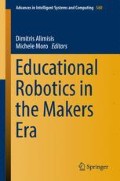Abstract
This paper reports a case study concerning the use of LEGO Mindstorms Robotics as an instructional tool in science education. In particular, the paper briefly delineates a teaching class module in the field of Science Education for the primary level. It is the authors’ expectation to evaluate the proposed methodology under a large-scale study designed to measure the effectiveness of this approach in terms of learning outcomes, students’ satisfaction, enjoyment and perceived usefulness.
Access this chapter
Tax calculation will be finalised at checkout
Purchases are for personal use only
References
Fagin, B., Merkle, L.: Measuring the effectiveness of robots in teaching computer science. ACM SIGCSE Bull. 35(1), 307–311 (2003). ACM
Mauch, E.: Using technological innovation to improve the problem solving skills of middle school students. Clearing House 75(4), 211–213 (2001)
Robinson, M.: Robotics-driven activities: can they improve middle school science learning? Bull. Sci. Technol. Soc. 25(1), 73–84 (2005)
Hussain, S., Lindh, J., Shukur, G.: The effect of LEGO training on pupils’ school performance in mathematics, problem solving ability and attitude: Swedish data. Educ. Technol. Soc. 9(3), 182–194 (2006)
Karatrandou, A., Panayiotakopoulos, C., Pierri, E.: Understanding the concepts of Physics in elementary school using Lego Mindstorms: a case study. In: Proceedings for 5th ETPE Conference, Thessaloniki, Greece, 5–8 October 2006
Sullivan, F.R.: Robotics and science literacy: thinking skills, science process skills and systems understanding. J. Res. Sci. Teach. 45(3), 373–394 (2008)
Catlin, D., Blamires, M.: The principles of educational robotic applications (ERA): a framework for understanding and developing educational robots and their activities. In: Proceedings for Constructionism 2010 the 12th EuroLogo Conference, Paris, France, 16–20 August 2010
Mitnik, R., Nussbaum, M., Soto, A.: An autonomous educational mobile robot mediator. Auton. Robots 25(4), 367–382 (2008)
Benitti, F.B.V.: Exploring the educational potential of robotics in schools: a systematic review. Comput. Educ. 58(3), 978–988 (2012). Lindh & Holgersson (2007)
Boykin, K.E.: Engineering Math Based Bridge Program for Student Preparation. ICETI (2010)
Şahin, Ç., Ipek, H., Ayas, A.: Students’ understanding of light concepts primary school: a cross-age study. Asia Pac. Forum Sci. Learn. Teach. 9(1), 1–19 (2008)
Anderson, C.W., Smith, E.L.: Children’s Conceptions of Light and Color: Understanding the Role of Unseen Rays. Research Series No. 166 (1986)
Grigorovitch, A.: Children’s misconceptions and conceptual change in Physics education: the concept of light. J. Adv. Nat. Sci. 1(1), 34–39 (2014)
Neale, D.C., Smith, D., Johnson, V.G.: Implementing conceptual change teaching in primary science. Elementary School J. 91, 109–131 (1990)
Herbart, J.F.: The Science of Education: Its General Principles Deduced from Its Aim and the Aesthetic Revelation of the World, vol. 19. DC Heath & Company (1895)
Author information
Authors and Affiliations
Corresponding author
Editor information
Editors and Affiliations
Rights and permissions
Copyright information
© 2017 Springer International Publishing AG
About this paper
Cite this paper
Panayiotou, M., Eteokleous-Grigoriou, N. (2017). Using LEGO Mindstorms as an Instructional Tool to Teach Science in Primary Education. In: Alimisis, D., Moro, M., Menegatti, E. (eds) Educational Robotics in the Makers Era. Edurobotics 2016 2016. Advances in Intelligent Systems and Computing, vol 560. Springer, Cham. https://doi.org/10.1007/978-3-319-55553-9_20
Download citation
DOI: https://doi.org/10.1007/978-3-319-55553-9_20
Published:
Publisher Name: Springer, Cham
Print ISBN: 978-3-319-55552-2
Online ISBN: 978-3-319-55553-9
eBook Packages: EngineeringEngineering (R0)

